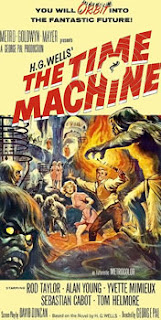The 2008 review shares its admiration for author's keen viewpoint, "when Wells wrote the original novella, he was well-acquainted with Darwin’s work, and it’s fascinating...that Wells pondered not an evolution of the species, but rather the devolution of our kind: a pervasive moral, intellectual and physical degradation" - or was it access Wells may have had to esoteric knowledge? The 2008 review shares insights into potent and enduring social commentary incorporated into plot:
"Finally, George stops his machine in the far-flung world of 802,701 AD....Another brilliant touch...Specifically, the Morlock 'call' for the Eloi to gather at their city entrance is the same air horn or siren noise that for generations warned humans to seek underground shelter during times of attack. That particular sound was heard so frequently throughout human history that the Eloi response has become quite literally Pavlovian in nature. The horns sound, and the Eloi drop everything and mindlessly go to the Morlocks…their enemies....Although the movie doesn’t specify it, the novel makes clear that the fat, lazy Eloi are the descendants of the leisure class; the industrial Morlocks are 'blue collar' workers. In the movie, they’re also blue skinned, hairy monsters with glowing eyes."So, Wells portrays a future where working class gets even by farming descendents of the rich - or leisure class? The 2008 review sounds a positive note in conclusion, although its more about human resiliency than a hopeful future:
"Think about it: George, the time traveler of the 1960 version, goes to the future, and sees what we have done to ourselves as a species through our constant divisions (social and military). But he doesn’t give up. He doesn’t cower. Instead, he fights for the human race. Ultimately, he commits himself to the world of 802,701 and sets about the hard work of building a new culture, a new civilization. The message here, right beneath the surface: Yes we can. We might fail, we might even hover on the precipice of total destruction, but we can choose to involve ourselves; to fight. And we will succeed. Otherwise, all the future’s just a…bridge to nowhere."Could it be Wells spelled out human nature as forever cyclical - a flowing course of social evolution and devolution, shaped mainly by need and circumstance? "The Time Machine" begins with part one of 11.

No comments:
Post a Comment